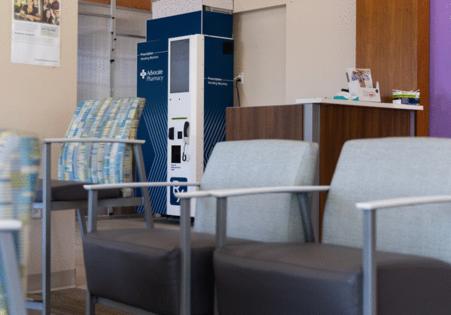Medicine from a vending machine? Advocate Health Care installs devices in Chicago
Published in Business News
CHICAGO — Most patients don’t expect to be sent to a vending machine immediately after a doctor’s appointment or a hospital stay.
But there are two new vending machines that dole out prescription medications — not snacks — at Advocate Trinity Hospital in Calumet Heights and Advocate Medical Group’s Imani Village clinic in Chicago's Pullman neighborhood.
The machines are stocked with common medicines — such as those to treat flu, bacterial infections and gastrointestinal issues — as well as those for chronic illnesses, including heart disease, high blood pressure and asthma. Patients can pick up their prescriptions right after their doctors’ appointments or after they’re discharged from the hospital.
Doctors ask patients if they’d like to pick up their medicine from the machines, and if they agree, doctors can send prescriptions to Advocate Health Care’s pharmacy team to check if the meds are available in the machines. If they are, the pharmacy team can verify the patient’s health insurance and the patient will get a call or text message.
Each vending machine has a large screen near the top, which patients use to confirm their identity. Patients also can pick up an attached phone receiver to have a video call with an Advocate pharmacist if they have questions.
The patients can then swipe a credit card, if necessary, and wait for the medication to tumble into the pick-up slot.
Advocate Health Care decided to install the machines after hearing from patients and doctors that patients are having trouble getting their medications, said Michelle Blakely, president of Advocate Trinity and South Suburban hospitals.
Part of the problem is that it can be difficult to find pharmacies on the South Side, parts of which are considered “pharmacy deserts,” Blakely said. Earlier this year, two Walgreens on the South Side closed as part of the company’s broader plan to shutter locations across the country.
And sometimes, patients can’t get rides to pharmacies, Blakely said.
“A patient discharges with a prescription, goes home, doesn’t fill the prescription and circles back to the hospital, unable to take those medications that we know could have made a difference for them,” Blakely said. “The pharmacy vending machine provides a nice way for us to place a prescription in a patient’s hands before they even leave our building.”
On a recent day, Dr. Julie Taylor, a family medicine physician with Advocate, offered to send a prescription for an antibiotic to the vending machine at the Imani Village clinic after seeing a patient with an infection.
“She would save money on transportation to the pharmacy, save time waiting,” Taylor said.
Taylor said her patients sometimes have to pay for rides to pharmacies, or have to wait several days until a pharmacy has a medication in stock. Recent pharmacy closures have also left remaining pharmacies in the area sometimes crowded with long wait times, she said.
So far, the two machines have dispensed more than 35 prescriptions since the one at Trinity was activated about a month ago and the one at Imani Village went into use in recent weeks, according to Advocate.
If the new vending machines allow even two or three people a day to get medications, “if it helps them, if it keeps them out of the hospital, it’s a benefit,” Taylor said. “It saves them time and money and headaches.”
Some, however, are wary about the role of such vending machines in health care, fearing what might be lost without a human pharmacist or pharmacy worker onsite.
Garth Reynolds, executive director of the Illinois Pharmacists Association, said that although a prescription vending machine is better than having no pharmacy access, he said it’s preferable to have onsite pharmacists or pharmacy staff involved in dispensing medications.
Reynolds said he’s seen similar vending machines pop up occasionally over the years but has yet to see one really take off.
“If we’re trying to be innovative and responsive to costs, we also have to be very careful that we’re not eroding the provider relationship between the patient and pharmacist,” Reynolds said. “Whether it’s in tele-pharmacies or in your corner pharmacy or neighborhood, patients react better to being able to have access to that human-to-human interaction.”
Reynolds said he does, however, appreciate that patients using the machines can talk to a pharmacist by video.
The vending machines are part of Advocate’s $1 billion plan to overhaul its health care delivery on the South Side. That plan includes replacing Advocate Trinity Hospital with a smaller but more updated hospital, as well as expanding access to primary and specialty care with more doctors and care locations.
The idea behind the overall initiative is to address long-standing health disparities by focusing more on keeping people healthy, according to Advocate. It’s also an opportunity for Advocate to serve an area of high need that has historically had fewer options for care than other parts of the Chicago area.
A third vending machine is slated to be installed at Advocate South Suburban Hospital in Hazel Crest late this year, and Blakely said there could be more machines at other Advocate locations in the future.
_____
©2025 Chicago Tribune. Visit chicagotribune.com. Distributed by Tribune Content Agency, LLC.












Comments